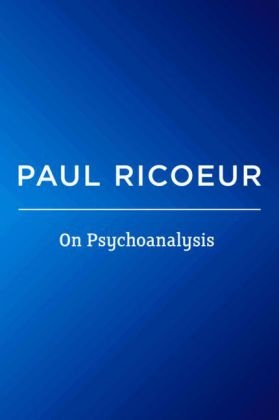Read more
Informationen zum Autor Paul Ricoeur (1913-2005) is widely recognized as one of the most distinguished philosophers of the twentieth century. He taught for many years at the University of Chicago Divinity School. His many works include Freud and Philosophy , Time and Narrative and Oneself as Another . Klappentext Paul Ricoeur's Freud and Philosophy was a major reinterpretation of psychoanalysis and its philosophical significance, but Ricoeur also wrote many important articles on similar themes. This volume makes available some of his key writings on Freud and psychoanalysis: together with Freud and Philosophy, they form a major part of his philosophical legacy.What kind of science is psychoanalysis? What kind of truth does it offer and what kind of proof does it provide? What does the concrete practice of psychoanalysis consist of? What can it tell us about creativity and the work of art? What is its place within our culture and how can it transform culture? What is the role of narrative in psychoanalysis?Ricoeur reading Freud: this could have been the title of this volume, in which the focus is on the actual work of Freud and not on subsequent commentaries. An open reading of intellectual integrity. A critical reading which shuns definitive positions. A reading to understand Freud.This book - the first volume of Ricoeur's writings and lectures - brings together texts which appeared between 1966 and 1988. It is published under the auspices of Le Fonds Ricoeur. Zusammenfassung Paul Ricoeur's Freud and Philosophy was a major reinterpretation of psychoanalysis and its philosophical significance, but Ricoeur also wrote many important articles on similar themes. This volume makes available some of his key writings on Freud and psychoanalysis: together with Freud and Philosophy, they form a major part of his philosophical legacy.What kind of science is psychoanalysis? What kind of truth does it offer and what kind of proof does it provide? What does the concrete practice of psychoanalysis consist of? What can it tell us about creativity and the work of art? What is its place within our culture and how can it transform culture? What is the role of narrative in psychoanalysis?Ricoeur reading Freud: this could have been the title of this volume, in which the focus is on the actual work of Freud and not on subsequent commentaries. An open reading of intellectual integrity. A critical reading which shuns definitive positions. A reading to understand Freud.This book - the first volume of Ricoeur's writings and lectures - brings together texts which appeared between 1966 and 1988. It is published under the auspices of Le Fonds Ricoeur. Inhaltsverzeichnis Acknowledgements Editor's Introduction Note about this edition Translator's Note The Question of Proof in Psychoanalytic Writings Psychoanalysis and Hermeneutics The Self in Psychoanalysis and in Phenomenological Philosophy Image and Language in Psychoanalysis Psychiatry and Moral Values The Atheism of Freudian Psychoanalysis Psychoanalysis and Art Life: A Story in Search of a Narrator Narrative: Its Place in Psychoanalysis Post-Script: Listening to Freud One Last Time Postface: Desire, Identity, the Other - Psychoanalysis for Paul Ricoeur after Freud and Philosophy, Vinicio Busacchi Origin of Texts Index ...
List of contents
* Acknowledgements
* Editor's Introduction
* Note about this edition
* Translator's Note
* The Question of Proof in Psychoanalytic Writings
* Psychoanalysis and Hermeneutics
* The Self in Psychoanalysis and in Phenomenological Philosophy
* Image and Language in Psychoanalysis
* Psychiatry and Moral Values
* The Atheism of Freudian Psychoanalysis
* Psychoanalysis and Art
* Life: A Story in Search of a Narrator
* Narrative: Its Place in Psychoanalysis
* Post-Script: Listening to Freud One Last Time
* Postface: Desire, Identity, the Other - Psychoanalysis for Paul Ricoeur after Freud and Philosophy, Vinicio Busacchi
* Origin of Texts
* Index
Report
"Ricoeur writes the best kind of philosophy - critical, economical, and clear."
New York Times
"One of the most distinguished and prolific philosophers of his generation."
Daily Telegraph
"While the volume may have been composed with Ricoeur specialists and students of psychoanalytic history and theory in mind as its core audience, it is of broad philosophical interest, both for theorists on the left and for others."
Marx and Philosophy

